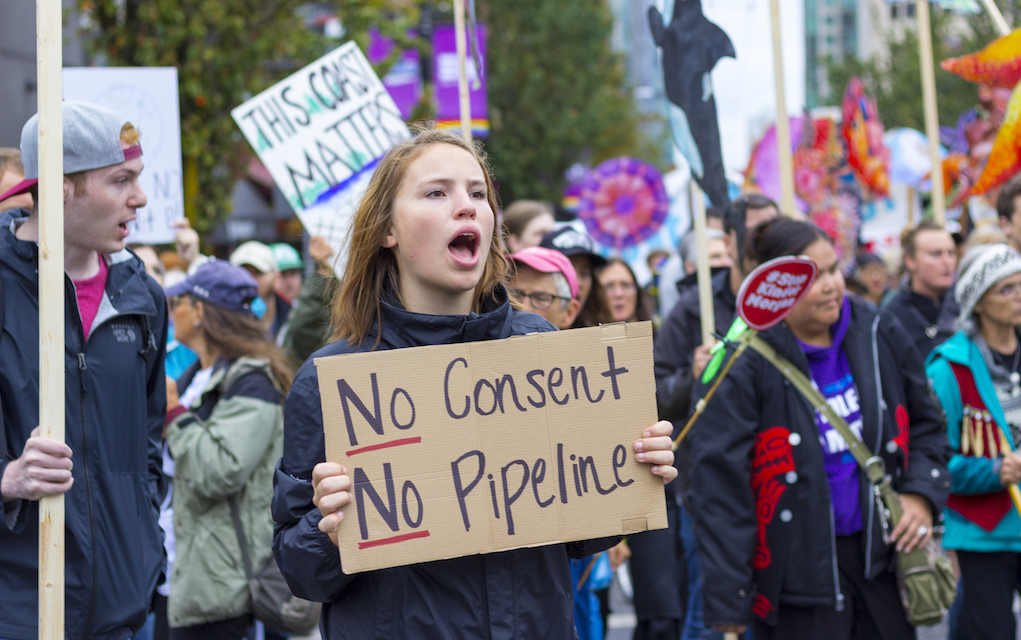Last time I checked, Alberta’s oilfields had not been seized by marauding bands of eco-warriors. But you might be confused into thinking so by the inflamed rhetoric coming out of Ottawa and Alberta.
We’re told that the country faces a national crisis over the resistance to the proposed Kinder Morgan pipeline, following an ultimatum by Houston-based Kinder Morgan that it’s suspending long-stalled building plans unless it’s assured a green light by May 31.
With both Alberta and Ottawa offering full-throttle support for the project, including potential financial backing, a chorus of rage has arisen from the country’s business and political ranks over B.C.’s refusal to fall into line.
Some commentators insist this shows Canada is broken, even implying Prime Minister Justin Trudeau is a sissy unless he gears up to send in the army to restore the rule of law.
So what precisely has B.C. done that it is trampling on the rule of law?
After hiring the distinguished former B.C. Supreme Court Justice Thomas Berger as a legal adviser, B.C.’s NDP government sought and won intervener status in a federal court case involving the pipeline, and it has announced plans to consult the B.C. public about developing new regulations to protect its environment from oil spills.
These seem like law-abiding measures.
In a legal showdown, Ottawa would almost certainly win, since it has constitutional power over projects it deems in the national interest. But without a Supreme Court ruling, it doesn’t seem outrageous for B.C. to test its right to protect its environment.
Business pundits complain that there’s no time to seek such a ruling since we’re staring at the May 31 deadline.
No doubt, Kinder Morgan has shareholders to satisfy, but should the timetable here — given the momentous issues involved — really be driven by the needs of a foreign company?
The pipeline would dramatically increase oil tanker traffic in the sensitive Burrard Inlet — to more than 400 supertankers a year — risking potentially devastating, long-lasting impacts from an oil spill that put the May 31 deadline in perspective.
B.C. Green Party leader Andrew Weaver, who holds the balance of power in B.C.’s government, notes that the diluted bitumen travelling through the pipeline from Alberta’s oilsands is more dangerous than regular oil if spilled into water.
“It sinks. We cannot clean up a spill,” said Weaver, an internationally recognized climate scientist, in an interview on CBC-TV’s Power and Politics.
Weaver, who was part of a team sharing a Nobel Peace Prize with Al Gore, dismissed the scientific review of the Kinder Morgan project carried out by the National Energy Board as a “sham.”
Then there’s the fact the pipeline would go through unceded Indigenous territory, where resistance to it has been fierce.
Martyn Brown, who was chief of staff to former B.C. premier Gordon Campbell, argues that B.C. should go further and bring in legislation giving Indigenous people shared jurisdiction over environmental protection related to oil spill prevention and cleanups.
Then, of course, there’s the matter of climate change; building a new pipeline means we’ll pump more oil, making it harder to reduce our carbon emissions.
Weirdly, Trudeau fashions himself as a champion of climate solutions. According to his backflip of an argument, the pipeline is key to an implicit bargain that allows Alberta to get its oil to market, in exchange for Alberta’s support for a carbon tax.
Only by pumping more carbon into the atmosphere can we hope to stop climate change — sort of like only by smoking more cigarettes can we hope to stop cancer.
Trudeau’s bargain has always seemed full of holes, but perhaps it has taken the Kinder Morgan ultimatum to finally out it as the truly unworkable, fraudulent deal that it is.
It’s premised on the notion of compromise, which isn’t necessarily a bad thing. It’s just that climate change isn’t something you can compromise on.
In a column in the National Post, Claudia Cattaneo expressed outrage over how B.C.’s intransigence is negatively impacting foreign investors, complaining that B.C. “doesn’t seem to grasp the implications of messing with a lawfully approved project.”
But she and other business commentators apparently don’t grasp the even bigger implications of messing with nature.
Linda McQuaig is a journalist and author. Her book Shooting the Hippo: Death by Deficit and Other Canadian Mythswas among the books selected by the Literary Review of Canada as the “25 most influential Canadian books of the past 25 years.” A version of this column originally appeared in the Toronto Star.
Photo: William Chen/Flickr




